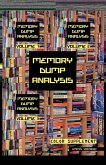Contains revised, edited, cross-referenced, and thematically organized selected articles from Software Diagnostics Institute (DumpAnalysis.org + TraceAnalysis.org) and Software Diagnostics Library (former Crash Dump Analysis blog, DumpAnalysis.org/blog) about software diagnostics, debugging, crash dump analysis, software trace and log analysis, malware analysis and memory forensics written in November 2011 - May 2014 for software engineers developing and maintaining products on Windows (WinDbg) and Mac OS X (GDB) platforms, quality assurance engineers testing software, technical support and escalation engineers dealing with complex software issues, security researchers, malware analysts, reverse engineers, and memory forensics analysts. The seventh volume features: - 66 new crash dump analysis patterns - 46 new software log and trace analysis patterns - 18 core memory dump analysis patterns for Mac OS X and GDB - 10 malware analysis patterns - Additional unified debugging pattern - Additional user interface problem analysis pattern - Additional pattern classification including memory and log acquisition patterns - Additional .NET memory analysis patterns - Introduction to software problem description patterns - Introduction to software diagnostics patterns - Introduction to general abnormal structure and behavior patterns - Introduction to software disruption patterns - Introduction to static code analysis patterns - Introduction to network trace analysis patterns - Introduction to software diagnostics report schemes - Introduction to elementary software diagnostics patterns - Introduction to patterns of software diagnostics architecture - Introduction to patterns of disassembly, reconstruction and reversing - Introduction to vulnerability analysis patterns - Fully cross-referenced with Volume 1, Volume 2, Volume 3, Volume 4, Volume 5, and Volume 6.
Hinweis: Dieser Artikel kann nur an eine deutsche Lieferadresse ausgeliefert werden.
Hinweis: Dieser Artikel kann nur an eine deutsche Lieferadresse ausgeliefert werden.








